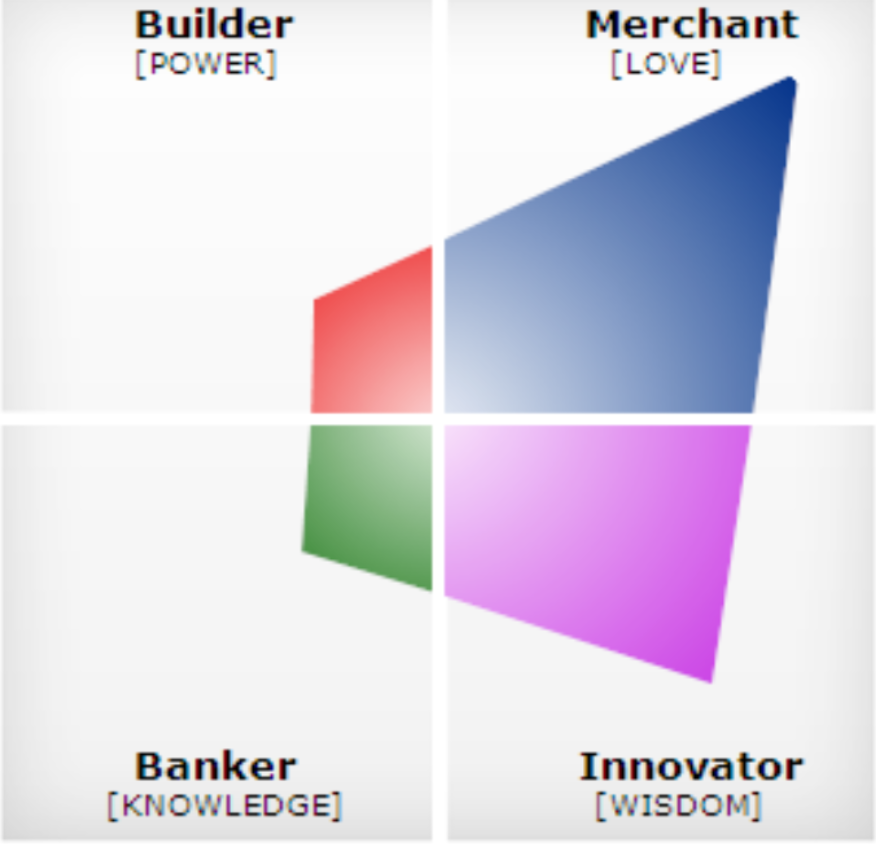
How well do you know your personality type?
Are you the person who’s a dreamer? The one who always has a lot of great ideas, but has trouble putting them into action?
Do you talk about the big project you’re working on that’s always getting delayed because you want it to be perfect?
Maybe you’re a workaholic who works nonstop and never takes time for themselves?
Perhaps you’re the person who is so scared to take risks that they’ve been in the same role for years, even though you don’t enjoy your job anymore?
If any of these descriptions resonate with you, chances are you may not be aware of how your personality type could be holding you back.
How well do you know yourself?
When I was asked this in the past, I didn’t have a good answer. I had a general idea that I was good at making connections and that I had a knack for reading people. I’d taken some personality tests in the past like Myers Briggs, but my results seemed to change every time so they didn’t seem accurate.
I’d never sat down to evaluate my greatest strengths until my coaching certification training. We had to take several different personality tests and two tests in particular- the Core Values Index and Strengths Finder helped me see myself in an entirely different light. When you see your strengths clearly outlined on paper, it’s like a lightbulb goes off. You think, “Oh yeah! I AM really good at that!” When I learned about my personality type, the clearer it became to me how to focus on doing the things I’m best at to grow my business more effectively. The best part is that it led to greater work life balance because I learned to stop doing the things I wasn’t good at or didn’t like to do.
When you see your strengths clearly outlined on paper, it’s like a lightbulb goes off. You think, “Oh yeah! I AM really good at that!”
The Core Values Index Assessment (the CVI)
The CVI Assessment was originally designed for companies to give their employees to make sure they were in the right seats at work based on their personality type. It shows what people’s greatest strengths are, and what energizes and motivates them most at work. By understanding this, employers could make sure they were leveraging each employees’ talents to the greatest of their abilities. They would know what types of tasks each employee should focus on that they were best at and enjoyed doing. This led to higher productivity and efficiency, greater engagement and increased fulfillment at work. As a result, businesses could see increased bottom lines and fewer missed days of work.
How the CVI can help you feel understood
After taking the CVI assessment, it was the first time I felt understood. I finally realized why I’d never fit in the corporate world and why I’d never felt happy in the typical 9 to 5 workday. I’d always thought there was something wrong with me. Now I know my personality type and that I’m born to be an entrepreneur. Not only have I found a career in coaching that I absolutely love, but I’ve had greater success in this job than in any other I’ve had in the past.
Take the CVI here to uncover your greatest strengths.
When you truly understand your strengths, you can leverage them to become your biggest moneymaker.
The Four Core Value Types
There are four main core value personality types: Merchant, Innovator, Builder and Banker.
The CVI assessment will tell you your two top core value types. Every person is a blend of the four different types. The degree to which you exhibit each type is shown in your results as a series of four colored areas. If one area is very large, that means you are in alignment with that type the majority of the time and find it energizing. If an area is very small, then it takes a lot of effort and you will find it de-motivating to do those types of activities because they drain you. Let’s review the four different personality types and highlight what their greatest strengths are. You can also watch my Facebook live here where I go over the CVI.
MERCHANTS
Merchants are driven to make connections and build relationships. They can see opportunities for the future that others can’t, and they have the ability to see the truth. This combination makes them inspired to help and motivate people. They are driven to build communities and love to share their ideas with others. They naturally attract others to them and thrive on appreciation and recognition from others. They are generally extroverted and act on their intuition. Many Merchants become entrepreneurs. Their greatest contribution to the world is relationships and vision.
The greatest challenges of a Merchant
- Being driven by their emotions
- Having a hard time saying no
- Getting easily distracted by new ideas (squirrel syndrome)
- Not wanting to “get into the weeds” to finish projects they’ve started
- Being self-motivated to consistently do the less enjoyable tasks (Banker or Builder type tasks)
Strategies for a Merchant
If you’re a merchant and you find that you don’t have any time for your business, take a look at your last week and evaluate the following:
- What did you say yes to that you shouldn’t have?
- What three things do you need to accomplish this week to move your business forward?
- How can you commit to doing them no matter what?
- Don’t take on any new projects unless you complete those three things.
Merchants need to remember: When you say no to something, you’re saying YES to a higher priority.
INNOVATORS
Innovators are strategic thinkers and problem solvers. They love making systems and processes better and helping people and things to function well together. They don’t give up easily and will stick with people or a problem until it’s solved. They’re more introverted and rely on their mental abilities instead of their intuition. Innovators do well in situations where they’re spending the majority of their time solving problems, or creating things like writing, art, photography etc.
Their highest contribution to the world is assessment and creating solutions.
The greatest challenges of an Innovator
- Perfectionism and not putting things out into the world before they’re ready.
- Overanalyzing
- Taking too long to make a decision
- Doubting themselves and being their own worst critic
Innovators will keep working on things and keep trying to perfect them because they think it can always be better which leads to delays, even if it’s ready.
Strategies for an Innovator
If you’re an innovator and you’re not seeing any traction in your business, take a look at your last week and evaluate the following:
- What is something I’ve been working on for too long that will move my business forward?
- What am I overanalyzing that’s causing me to not take action?
- What thoughts am I having that may be preventing me from believing in myself?
- Don’t take on any new projects until the ones you’ve started are completed.
A really important strategy for innovators is to set deadlines and stick to them. The shorter, the better.
Innovators need to remember: Done is better than perfect.
BUILDERS
Builders are people who take action and are natural leaders. They love getting things done now and seeing results from their action or leadership. They rely on their instincts, are high risk takers, and are highly self-motivated. Builders flourish in situations where they can take charge and not be micromanaged. Therefore they do well when they have a lot of room to make decisions and act. Their highest contribution to the world is action and results.
The greatest challenges of a Builder
- Working too hard
- Being impatient and getting frustrated easily if others around them aren’t competent or work hard
- Making time for themselves and their own well-being
Builders tend to be workaholics. If they’re not careful, it can lead to burnout very quickly. For example, if they’re a Merchant Builder, they have a hard time saying no so they end up doing everything for everyone. Therefore, they need to have patience when working with others who aren’t builders and give people enough time to complete projects.
Strategies for a Builder
They need to set clear boundaries around their work and personal time and stick to it. They will do whatever it takes to get things done so they need to learn to put their health and mental and emotional well-being first.
Builders need to remember: It doesn’t all have to be done now.
BANKERS
Bankers are the least understood group. They are the people who protect us from risk. They love having all the facts and data and have the best knowledge. They are self-motivated and are good at doing detail-oriented work. They do not rely on their intuition- they rely solely on their mental abilities and on things that can be proven. They do well working in stable environments that have rules and procedures. Their highest contribution to the world is risk avoidance and information.
There aren’t too many entrepreneurs who are Bankers because they avoid risk, and what’s riskier than starting your own business?
The greatest challenges of a Banker
- Being open to new ideas and opportunities
- Reluctance to put themselves out there
- Taking risks
- Thinking outside the box
As a result, Bankers often times miss golden opportunities because they avoid risk at all costs, which can prevent them from having real success. They don’t believe anything unless it’s proven, and are reluctant to try anything new. This can cause them to not tap into their full potential.
Strategies for a Banker
Be open to opportunities and trying new things. Find an accountability partner like a Merchant or a Builder who can encourage you to take more risks. Challenge yourself to try one new thing per week to get out of your comfort zone.
Bankers need to remember: Take the risk or lose the chance.
Analyzing Your CVI Result
After you take the CVI, you’ll get a notification with a short video describing your personality type and an image of your results that will look something like this:

In this example, this person is a Merchant Innovator. They are a very high Merchant, and will spend over 90% of their time exhibiting that type. In addition, their Innovator is also fairly high, so they will find acting as an Innovator energizing. On the other hand, they are very small in both the Builder and Banker areas, which means it takes a lot of effort to do those types of activities and they find them draining. It doesn’t mean they can’t do them, but it takes a lot more energy and it’s not something they enjoy doing.
Ideally you should be spending 80% of your time in the areas you’re highest in and limit the amount of time in the areas you’re lowest in for your personality type.
You should be spending 80% of your time using your greatest strengths.
Conclusion
Your personality type can be your greatest asset or your biggest liability. If you understand your greatest strengths, you’ll know what areas you should focus on and what things to be aware of that could derail your success.
As a result, you start to focus your energies in the areas you’re highest in, and you’ll become more productive, efficient and happier. After that, you’ll start to see more success in both your business and your personal life. And you’ll be contributing to the world as the best version of yourself, which is the ultimate path to happiness and fulfillment.
